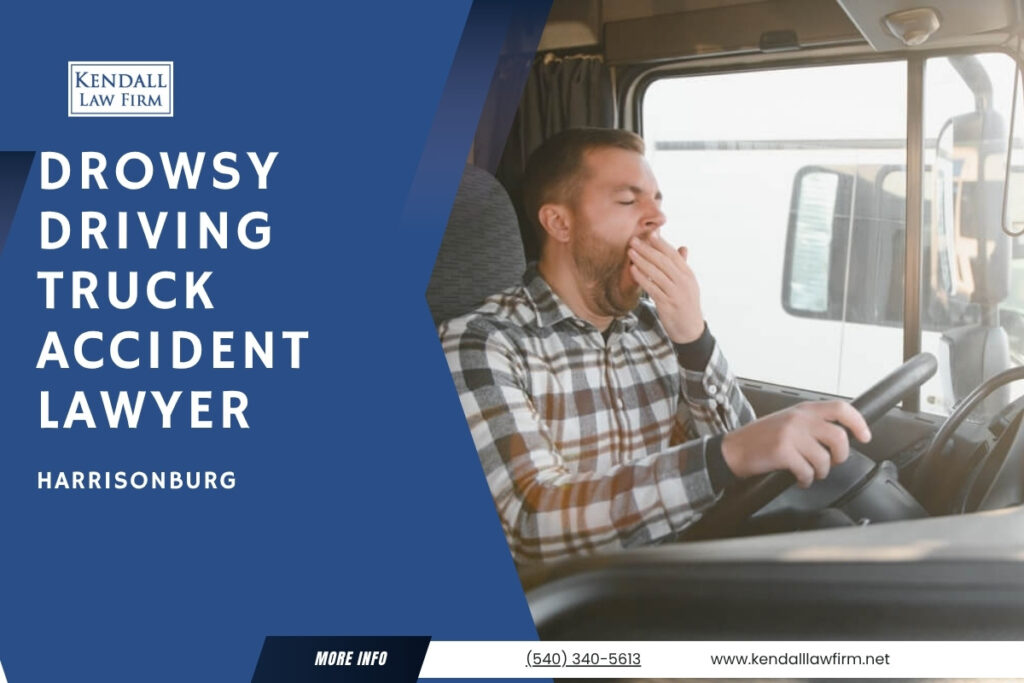Harrisonburg Drowsy Driving Truck Accident Lawyer
Truck drivers often push themselves beyond the point of exhaustion to meet unreasonable delivery deadlines. When drivers continue to drive despite being dangerously fatigued, they put everyone on the road at risk. Fatigue slows drivers’ reaction times, impairs their judgment, and causes them to miss critical cues, often leading to motor vehicle accidents. The size and weight of commercial trucks magnify the risks of severe injuries in crashes involving truck driver fatigue.
At Kendall Law Firm, we’ve seen firsthand the devastating effects of truck accidents caused by drowsy driving. Firm founder David Kendall brings over 30 years of legal experience to helping individuals who have been injured seek fair compensation. As a Marine Corps veteran and former military lawyer, David Kendall understands the value of service and dedication. The legal professionals at Kendall Law understand the unique challenges of truck accident cases and are here to help you fight for compensation to rebuild your life. Contact our Harrisonburg truck accident lawyer or complete our contact form to schedule a complimentary consultation.
What Causes Drowsy Driving Truck Accidents in Harrisonburg?
Harrisonburg’s highway network includes Interstate 81, a major north-south corridor heavily used by semi-trucks and other commercial truck traffic. Due to the high volume of large trucks, semi-truck accidents involving fatigued drivers are a common occurrence.
Harrisonburg truck accidents involving exhausted drivers occur in numerous ways, including the following:
- Drifting Into Other Lanes – Tired drivers often struggle to stay focused and stay in their lane. A drowsy trucker might drift into another lane, sideswiping a car or forcing a driver off the road.
- Missing Traffic Signals or Signs – A fatigued truck may fail to see red lights, stop signs, or warning signals, which can lead to dangerous intersection collisions or rear-end crashes.
- Delayed Reaction Times – Fatigue slows a driver’s ability to react to sudden changes, such as a car braking ahead or a pedestrian crossing the street. That slowed reaction time can mean the difference between a near miss and a deadly accident.
- Poor Judgment and Decision-Making – Drowsiness affects drivers’ mental alertness. A fatigued trucker may take unsafe turns, speed, or follow other vehicles too closely without realizing the risk.
- Failure to Brake in Time – Tired drivers often struggle with depth perception and attention. This can cause them to brake too late, leading to rear-end crashes or pileups.
- Falling Asleep at the Wheel – In the most extreme cases of driver sleepiness, a truck driver may fall asleep behind the wheel. This can lead to high-speed collisions involving passenger vehicles and a large truck, jackknife accidents, and tractor-trailers veering off the road entirely.

Why Drowsy Driving Is as Dangerous as Drunk Driving
People often underestimate the dangers of fatigue. Yet, research shows that driving after going more than 20 hours without sleep has similar effects to driving while intoxicated. Some of the ways that fatigue affects drivers’ abilities include:
- Reduced Focus and Attention – Drowsy drivers struggle to stay alert. Drowsiness can cause drivers to miss road signs and traffic signals. It impairs their ability to recognize and react to road hazards.
- Poor Coordination – Drowsiness makes it harder to steer precisely or stay centered in a lane, especially on winding roads or in heavy traffic.
- Microsleeps – An exhausted driver may experience brief, involuntary periods of sleep that last just a few seconds. With a fatigued driver behind the wheel of an 80,000-pound truck, even one microsleep can have deadly consequences.
- Increased Risk-Taking – Fatigued drivers may take chances they wouldn’t usually take, such as speeding, tailgating, or skipping rest breaks, putting others at risk.
Some factors that contribute to fatigue among commercial truck drivers include:
- Tight Delivery Schedules and Employer Pressure – Trucking companies often pressure drivers to meet tight deadlines. That pressure can lead drivers to skip rest breaks or drive longer than is safe or legal. Many employers encourage truck drivers to disregard federal hours-of-service regulations, which limit the number of hours a commercial driver can operate without a rest break.
- Irregular Sleep Schedules – Many truckers drive overnight or have irregular sleep schedules, which disrupt their natural sleep cycle and make it harder to stay alert. · Sleep Disorders Like Sleep Apnea – Conditions like obstructive sleep apnea are common among truck drivers and can cause poor sleep quality and daytime drowsiness.
- Prescription and Over-the-Counter Medications – Certain medications, including allergy medications, pain relievers, and sleep aids, can cause drowsiness and impair alertness.
- Use of Alcohol or Drugs – The standard for impaired driving is stiffer for commercial drivers than for other drivers because of the greater harm a large truck operated by a drunk driver may cause. Even small amounts of alcohol, marijuana, or other substances can increase drivers’ fatigue and slow their reaction times.
Injuries and Damages Common in Fatigued Truck Accidents
Truck collisions are generally more likely to result in catastrophic injuries because trucks are larger and heavier than passenger vehicles. The risk of serious injuries increases in drowsy driving truck crashes because drivers may fall asleep and fail to brake in time to avoid a collision.
Common injuries in these accidents include:
- Traumatic brain injuries
- Spinal cord injuries
- Crushed or severed limbs
- Severe burns
- Internal bleeding
- Internal organ injuries
- Scarring and disfigurement
- Broken bones
- Soft-tissue injuries
- PTSD and other psychological conditions
The compensation that may be sought in a truck accident claim depends on the severity of the accident victim’s injuries, financial losses, insurance coverage, and the determination of fault. An experienced truck accident law firm, such as Kendall Law Firm, can gather your medical bills and income statements to calculate your losses resulting from the accident.
Your claim could include compensation for:
- Current and future medical expenses
- Lost income and reduced future earnings
- Pain and suffering
- Emotional distress
- The cost to repair or replace your car and other damaged property
How a Harrisonburg Truck Accident Lawyer Can Help
The legal team at Kendall Law Firm recognizes that you may be going through one of the most challenging ordeals of your life if you have been seriously injured in a Harrisonburg truck accident. You may have questions about the steps you can take.
Attorney David Kendall, a local attorney, can help you move forward and seek maximum compensation from the at-fault party’s insurance company. We’ll start by investigating the crash and identifying the potentially responsible parties. We’ll collect your medical records and financial records to document the harm you’ve suffered. We will consult with your doctor if you are likely to need ongoing or future medical treatment.
David Kendall is a skilled negotiator. He will negotiate with the at-fault parties and their insurance companies to demand a fair settlement. He will push back against attempts to blame you for the collision and will be prepared to take your case to trial if it’s in your best interests.
Let a Harrisonburg truck accident attorney advocate for you during this difficult time. You can call now or complete our online contact form to schedule a free consultation.


